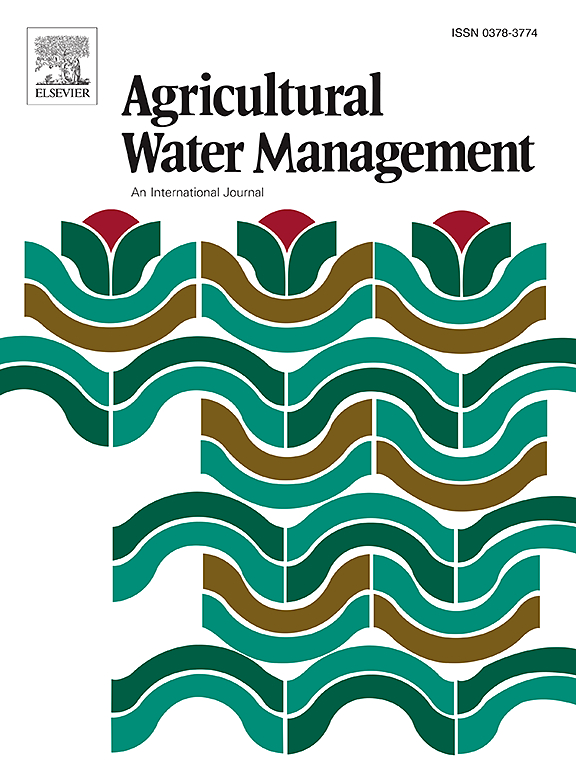调节性亏缺灌溉对加工番茄果实成熟期质量变化动态的影响
IF 5.9
1区 农林科学
Q1 AGRONOMY
引用次数: 0
摘要
品质是制约番茄加工业发展和经济效益的关键因素,提高番茄品质已成为新疆番茄加工业发展的热点。调亏灌溉(RDI)是一种非生物的作物产量和品质调控手段,广泛应用于作物产量和品质的提高。本研究旨在通过在中国新疆进行为期 2 年(2022-2023 年)的备案试验,采用 5 种灌溉水处理,研究 RDI 对加工番茄果实成熟期品质动态变化的影响。结果表明,与常规灌溉相比,调亏灌溉显著节约灌溉用水 315-1260 m3 ha-1。轻度 RDI 使单果重和果实硬度分别增加了 0.15 % 和 3.29 kg cm2,从而提高了加工番茄的产量和贮运品质。中度 RDI 使果实中可溶性固形物、可溶性糖和番茄红素的含量分别增加到 0.6 %、0.56 % 和 3.53 μg/g,从而显著改善了加工番茄的营养质量和风味质量。最后,通过采用与理想解相似的排序偏好技术(TOPSIS)模型,结合加工水果的外观、营养、风味和贮运指标进行综合评价,得出结论:W1 处理是一种兼顾产量和质量的可持续水管理方法。因此,建议新疆番茄果实加工的最佳亏缺灌溉模式为 W1 处理,而 W2 处理可作为备选模式。该研究为新疆番茄加工业的大规模发展和实施有效的节水农业提供了支持。本文章由计算机程序翻译,如有差异,请以英文原文为准。
Impact of regulated deficit irrigation on the dynamics of quality changes in processing tomato fruits during ripening
Quality is a key factor restricting the development and economic benefits of the tomato processing industry, and improving the quality of tomatoes has become a hotspot in the development of the tomato processing industry in Xinjiang. Regulated deficit irrigation (RDI) is an abiotic means of crop yield and quality control widely used for crop yield and quality improvement. This study aimed to investigate the impact of RDI on the dynamics of quality changes in processing tomato fruits during ripening via a 2-year (2022–2023) filed experiment with five water irrigation treatments in Xinjiang, China. The results showed that compared with conventional irrigation, regulated deficit irrigation significantly saved 315–1260 m3 ha−1 irrigation water. Mild RDI increased the single fruit weight and fruit hardness by 0.15 % and 3.29 kg cm2, respectively, thus improved the yield and storage and transportation quality of processed tomatoes. Moderate RDI increased the contents of soluble solid, soluble sugar and lycopene in fruit to 0.6 %, 0.56 % and 3.53 μg/g, respectively, therefore significantly improved the nutritional quality and flavor quality of processed tomato. Ultimately, a comprehensive evaluation using a coupled Technique for Order Preference by Similarity to an Ideal Solution (TOPSIS) model, taking into account the appearance, nutrition, flavor, and storage and transportation indexes of processed fruits, concluded tha W1 treatment is a sustainable water management approach that balances yield and quality. Therefore, the optimal deficit irrigation model for processing tomato fruits in Xinjiang was recommended to be the W1 treatment, whereas the W2 treatment was considered as an alternate model. The study supported the large-scale development of the tomato processing industry in Xinjiang and the implementation of effective water-saving farming.
求助全文
通过发布文献求助,成功后即可免费获取论文全文。
去求助
来源期刊

Agricultural Water Management
农林科学-农艺学
CiteScore
12.10
自引率
14.90%
发文量
648
审稿时长
4.9 months
期刊介绍:
Agricultural Water Management publishes papers of international significance relating to the science, economics, and policy of agricultural water management. In all cases, manuscripts must address implications and provide insight regarding agricultural water management.
 求助内容:
求助内容: 应助结果提醒方式:
应助结果提醒方式:


